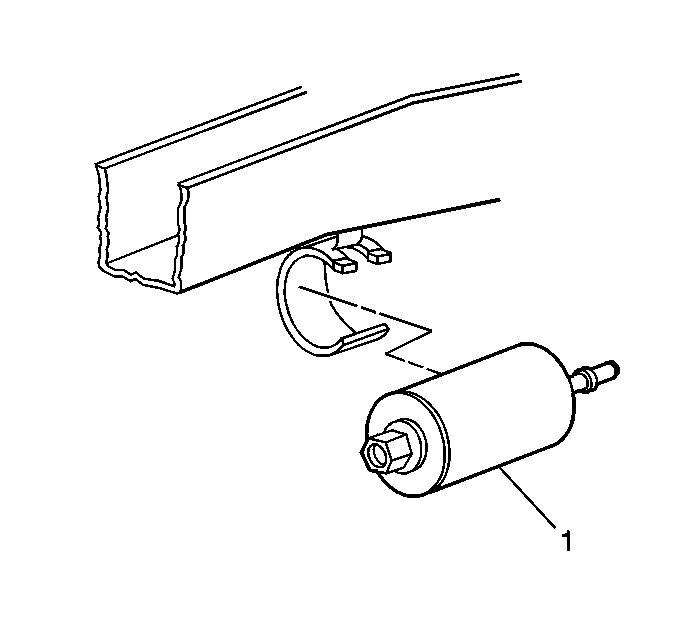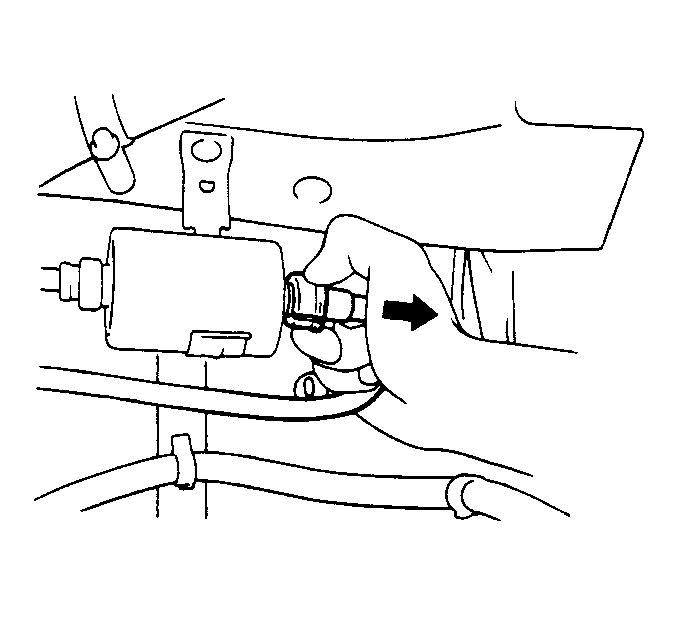Removal Procedure
The fuel filter is located under the rear of the car, rearward of the
fuel tank. There is no service interval for fuel filter replacement. Replacement
is required only if the fuel filter becomes restricted.

Caution: Unless directed otherwise, the ignition and start switch must be in the OFF or LOCK position, and all electrical loads must be OFF before servicing
any electrical component. Disconnect the negative battery cable to prevent an electrical spark should a tool or equipment come in contact with an exposed electrical terminal. Failure to follow these precautions may result in personal injury and/or damage to
the vehicle or its components.
- Remove the
negative battery cable.
- Relieve the fuel system pressure. Refer to
Fuel Pressure Relief
.
Caution: Provide additional support when a vehicle is on a hoist in the following
ways:
| • | Before removing parts, support the opposite end. This helps prevent
the vehicle from slipping off. |
| • | Before removing major components, chain the vehicle frame to the
hoist pads at the same end as the removal. This helps avoid a tip-off. |
- Raise the vehicle and suitably
support. Refer to
Lifting and Jacking the Vehicle
in General
Information.
- Using a back-up wrench, remove fuel filter fitting.
Caution: In order to Reduce the Risk of Fire and Personal Injury:
| • | If nylon fuel pipes are nicked, scratched or damaged during installation,
Do Not attempt to repair the sections of the nylon fuel pipes. Replace them. |
| • | When installing new fuel pipes, Do Not hammer directly on the
fuel harness body clips as it may damage the nylon pipes resulting in a possible
fuel leak. |
| • | Always cover nylon vapor pipes with a wet towel before using a
torch near them. Also, never expose the vehicle to temperatures higher than
115°C (239°F) for more than one hour, or more than 90°C (194°F)
for any extended period. |
| • | Before connecting fuel pipe fittings, always apply a few drops
of clean engine oil to the male pipe ends. This will ensure proper reconnection
and prevent a possible fuel leak. (During normal operation, the O-rings located
in the female connector will swell and may prevent proper reconnection if
not lubricated.) |
- Grasp the fuel filter and nylon fuel connection line fitting. Twist
quick-connect fitting 1/4 turn in each direction to loosen any dirt within
fitting. Using compressed air, blow out dirt from quick-connect fittings
at end of fuel filter.

- Remove the quick connect
fitting by pushing inward toward the fuel filter and grasping plastic tab
around the connector and pull apart.
- Remove the fuel filter (1).
Installation Procedure
Caution: Always apply a few drops of clean engine oil to the male pipe ends before
connecting the fuel pipe fittings in order to reduce the risk
of fire and personal injury. This will ensure proper reconnection and prevent
a possible fuel leak. During normal operation, the O-rings located in the
female connector will swell and may prevent proper reconnection if not lubricated.

- Remove the protective
caps from the new filter.
- Install the filter (1) in same position as the old filter.
| • | Apply a few drops of clean engine oil to the male tube end of
the filter and of the fuel sender assembly. |
| • | Push connectors together to cause the retaining tabs/fingers to
snap into place. |
Notice: Use the correct fastener in the correct location. Replacement fasteners
must be the correct part number for that application. Fasteners requiring
replacement or fasteners requiring the use of thread locking compound or sealant
are identified in the service procedure. Do not use paints, lubricants, or
corrosion inhibitors on fasteners or fastener joint surfaces unless specified.
These coatings affect fastener torque and joint clamping force and may damage
the fastener. Use the correct tightening sequence and specifications when
installing fasteners in order to avoid damage to parts and systems.
| • | Once installed, pull on both ends of
each connection to make sure they are secure. |
Tighten
| • | Use back up wrench to prevent filter, O-ring or fuel line
damage. |
| • | Tighten the fitting to 27 N·m (20 lb ft). |
- Install the fuel filter fitting using a new O-ring.
- Lower the vehicle.
- Install the fuel filler cap.
- Install the negative battery cable.
- Inspect for fuel leaks through the following steps:
| 7.1. | Turn the ignition switch to the ON position for 2 seconds. |
| 7.2. | Turn the ignition switch to the OFF position for 10 seconds. |
| 7.3. | Turn the ignition switch to the ON position. |
| 7.4. | Check for fuel leaks. |



